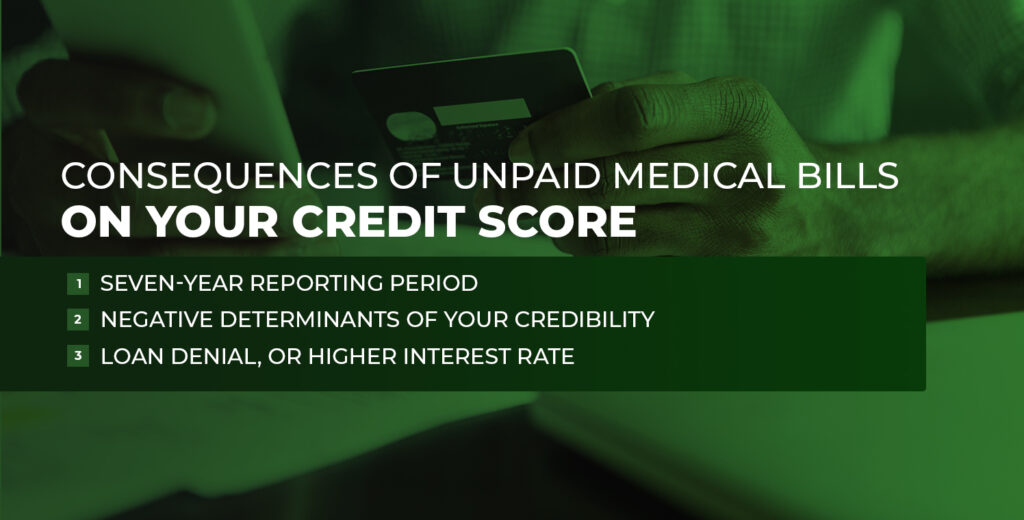Keeping up a good credit score is essential in the current financial environment. Everything from getting a mortgage to getting good interest rates on loans to even getting into particular job opportunities can be affected by a low credit score. But the disregarded part of credit management is how medical bills affect credit scores?
KFF conducted a survey in February 2024 that showed the startlingly high incidence of medical debt in America. An estimated $220 billion in medical debt is weighing heavily on millions of Americans. About 6% of adults owe medical debt, and 1% of them owe over $10,000.
Find out how proactive financial management can lower negative effects on creditworthiness by knowing the possible impact of medical debt on credit scores.
Do Medical Bills Affect Credit Score?
Yes, medical bills affect your credit scores. It helps first to realize that if you pay your medical bill on time, it won’t harm your credit. ExperianTM, Equifax®, and TransUnion® are the three main credit bureaus that compile your credit report. They compile information on borrowers from many sources, including banks, credit card companies, and public records. They usually do not receive the bill you receive from a hospital or the payment plan you work out with a provider. If the bill is not paid, though, your credit might suffer.
Your healthcare provider may try to get in touch with you by phone or letter if you owe money on a bill. If the bill goes unpaid, usually for a few months, the provider can choose to assign the debt to a collection agency. This can hurt your credit. Usually showing on your credit report, collections accounts take many years to disappear. This lowers your credit score and could make you less creditworthy to lenders.
Is Credit Improved by Paying Off Medical Collections?
Both your credit scores and your peace of mind depend on your paying off valid medical debt. Medical bills affect credit scores unbelievably. In fact, medical bills suffer for up to seven years if outstanding medical collection accounts total more than $500.
There is, nonetheless, good news. This kind of debt won’t harm you permanently since it can only end up on your credit report for seven years, according to Section 605 of the Fair Credit Reporting Act. Your credit reports will not reflect any account that you or your insurance company has settled with a collection agency. Consequently, your credit score can immediately improve with its removal.
Consequences of Unpaid Medical Bills on your Credit Score

Unresolved or late medical expenses can have a negative impact on your credit score. The impact of medical debt on your credit is explained here:
- Seven-Year Reporting Period: Medical debt that you obtain and do not pay off can be reported to credit agencies. Usually, this reporting happens when the debt collector or medical facility managing the debt changes the status of your account to indicate non-payment or delinquency. Once disclosed, this data is included in your credit report, a thorough account of your credit history.
Here’s when the seven-year reporting period becomes relevant. Most negative information including unpaid medical debt—can stay on your credit report for up to seven years after the initial delinquency date, according to the Fair Credit Reporting Act (FCRA).
Over this seven-year period, the outstanding medical debt might lower your credit score. At around 35% of your FICO score, payment history is one of the most important elements in credit assessment. Unpaid medical expenses, therefore, indicate to creditors and lenders that you could be a higher-risk borrower, leading to the damage in your credit score. - Negative Determinants of your Credibility: How credit scoring algorithms calculate medical debt—especially unpaid medical collections—is one important way that they vary. More recent models, including FICO 9 and FICO 10, have, for instance, changed to give unpaid medical collections less weight than other collections, such as credit card or utility bill payments. These more recent models try to provide a more true picture of creditworthiness as they understand that medical debt may not always be a good indicator of a person’s credit risk.
However, unpaid medical collections can continue to be seen by certain lenders as major negative indicators in determining credit risk, even with the improvements made in more recent credit scoring models. - Loan Denial, or Higher Interest Rate: One of the biggest determinants of your credit score, your payment history, might suffer from unpaid medical debt. The credit agencies get notifications when medical invoices remain due and sent into collections. Lower credit scores could result, which would suggest a greater risk to lenders.
Lenders see you more riskily if your credit score is lower. Lenders look at your credit score when you apply for new credit—a mortgage, vehicle loan, or credit card—to see whether you qualify. Receiving a lower score because of outstanding medical debt increases your likelihood of getting turned down for credit because lenders may think you are more likely to miss payments.
To lenders, a lower credit score suggests more risk. Lenders look at your credit score when you apply for new credit—a mortgage, car loan, or credit card, to see whether you qualify. Receiving a lower score because of outstanding medical debt increases your likelihood of getting turned down for credit because lenders might believe you are more likely to miss payments.
You can pay more in interest even if your lower score gets you accepted for credit. Interest rates are one way lenders make up for the risk they see in lending to someone with a lower credit score. Throughout the course of the loan or credit account, higher interest rates equate to higher payments. For example, with a mortgage, a higher interest rate can result in thousands of dollars in additional costs over the loan term.
Keep your Credit Score As Healthy as Yourself!
At MDS, we are clear on the impact of medical debt on credit scores. Quick payment of these debts is essential to avoiding long-term financial repercussions. As a medical debt collection agency, we provide all-inclusive solutions that help both patients and healthcare institutions. Our services are designed to ensure that medical expenses do not negatively impact credit scores, therefore preserving both consumers’ financial stability and healthcare providers’ operational effectiveness.
Our wide selection of services, which includes everything from Text & Pay Solutions to Extended Business Solutions, guarantees fast debt payment, lowering the possibility of damaging credit ratings. We also support healthcare providers in preserving good connections with their patients by using modern technologies and upholding stringent regulatory requirements.
Give MDS the task of skillfully and compassionately managing your medical collections so that patient satisfaction and your financial security are given priority. To find out more about how we could help your practice, visit our website or get in touch with us right now.
